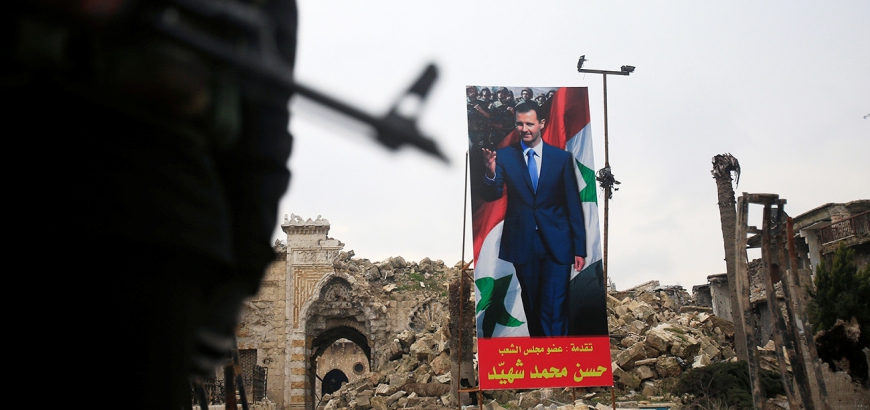The Assad regime has carefully confiscated the properties of Syrians using a number of methods, which have been legitimized through laws — some of them approved with the signature of Bashar al-Assad, such as Law No. 10 which was issued in April 2018, and which allows the authority of any administrative unit to establish new organizational zones in the areas for which it is responsible.
Confiscating properties is not new, and Syrians still discuss what Hafez al-Assad did, using his powers to steal the property of many civilians, including agricultural land, under the pretext of the public interest, whereby these lands were taken for long periods without any material compensation.
Abou Sabhi — a false name for a man in his 40s from the Damar area of the Damascus countryside who spoke to Alsouria Net said, “My family has large shares of farmland in Jabel Qasioun and the Damar area, and at the end of the 70s, Assad took over our land, which was full of olive trees.”
He added that their land in the Damar area was used by the regime and turned into residential housing, which was given to soldiers. He said that his family did not receive any compensation or even an apartment.
As a result, Sabhi was forced to rent, telling Alsouria Net, “I was ordered off my land, which became part of the luxury area in the Damar project, and today I live outside Syria. I tried to find out from my friends what the fate of this property was, but the civil servants refused to give us any information about these records, and it’s likely that it became state property.”
Assad’s forces have targeted specific areas over the last seven years, and have destroyed the infrastructure of many informal and rural areas, while also destroying the foundations of these homes in areas, stealing the land and forcibly displacing the residents.
The residents have to choose whether to sell their homes very quickly at a very low price, or to leave these houses temporarily — and this latter choice gives space for the regime to lay its hands on many properties, claiming that its owners have not established their ownership according to the conditions stipulated by Law No. 10.
The Iranians have a strong presence in some of these areas, which the regime has prepared to take control of after inflicting heavy damage upon them. This was what Umm Haitham, from Homs city, told Alsouria Net.
Haitham, who was forced to flee her home to Damascus, said, “We were displaced from the old al-Waer district in Homs to the capital because of the military operations that were ongoing there, and news of our district was cut off. Afterwards we learned that the army has set up artillery on the roof of our house because it was at a strategic point.”
She added, “Our neighbors sent a picture of our house, a large part of which was destroyed, and we heard a lot about the confiscation of homes in this area to be given to the children of martyrs because their owners were considered traitors. Through our relatives, we tried to sell our property at a price which was no more than a fraction of its value to an Iranian businessman who was the only one buying destroyed property in our district — and at very low prices.”
The Assad regime has given reassurances about Law 10, when countries such as Lebanon and Germany expressed their concerns about the decision, because it could obstruct the return of Syrian refugees, as a result of the loss of their property. The regime said that it gave a deadline to those outside Syria to establish their ownership through an intermediary who could be a relative up to the fourth degree.
However the testimonies of Syrians who have tried to establish their ownership have revealed the opposite — especially given that the regime has put on their wanted lists the names of a large number of Syrian refugees who are afraid to return to the country. If they rely on one of their relatives for help, these people will face major difficulties completing the transaction.
In this context, Umm Youssef from Damascus, told Alsouria Net, “My three sons fled to Germany to avoid conscription in the army, and they each own a home in the Qadisiya area in the Damascus countryside. I have the power to dispose of their property. Once I returned to Qadisiya I decided to rent out these houses through an agent. But I wasn’t able to obtain the security approval. The secretary of the branch told me that my sons fled their national duty and they had to return to serve their country and hand themselves in, or their homes would become state property.”
Major Damage From Law 10
Law No. 10 is currently being implemented openly in the city of Qusair in Homs province, where the city council has announced the issuance of digital zoning plans for the city, and has asked those who want to submit an objection, to address the city council within a specified period.
The zoning plans were announced on Oct. 10, 2018 and the period for objections ends Nov. 9, 2018 — a short period which will prevent many city residents from establishing their ownership, especially those the regime has accused of terrorism.
At the start of November, residents in the al-Tadamon district in southern Damascus said that regime authorities had prevented tens of thousands of families from returning to their homes on the pretext of Law No. 10’s implementation. The district’s residents were shocked after the issuance of a report by the Damascus province council concerned with studying and implementing Law No. 10 in al-Tadamon.
This article was translated and edited by The Syrian Observer. Responsibility for the information and views set out in this article lies entirely with the author.


